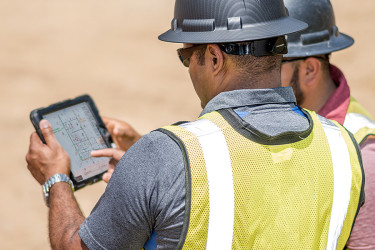Trade school for construction: Is this thing worth it?
 Trade school, AKA vocational school or technical school, teaches the skills needed to perform the work for a particular job. A trade school offering courses on building and construction, then, can prepare you to do well in a construction job. But is it necessary, or a waste of time and money?
Trade school, AKA vocational school or technical school, teaches the skills needed to perform the work for a particular job. A trade school offering courses on building and construction, then, can prepare you to do well in a construction job. But is it necessary, or a waste of time and money?
If you’re considering a career in construction, you may be weighing the pros and cons of trade school, considering whether it’s worth it. Short answer: Yes, it is. Longer answer: Read on.
How much trade school costs
The cost of trade school varies. Tuition can be anywhere from $1,000 to more than $30,000 per year.
On average, tuition at a public two-year trade school costs about $3,900 a year while a private two-year trade school costs about $15,000 a year. Add $1,300 a year for books and supplies, and you can get a sense of what a two-year program would cost.
Of course, many trade schools offer multiple forms of financial aid — grants, scholarships, subsidized loans, etc. — as well as paid on-the-job training, so don’t discount a program based solely on its sticker price.
Additionally, you could be eligible for financial help based on need or merit. Some states (California and Florida, for example) offer grants for vocational students. And there are scholarships available through industry organizations such as the National Association of Women in Construction and Associated General Contractors.
But even a relatively high $30,000 tab for two years at a private trade school is a bargain compared to the average cost of a four-year college — $120,000!
Benefits of trade school
- Hands-on experience
- On-the-job training
- Placement assistance with industry employers
- Fast-track to joining the workforce
- Minimal student debt
- Small classes
Do you need to go to school for construction?
The Bureau of Labor Statistics posted that construction workers don’t need a formal education — that construction can be learned through on-the-job training.
But if you’re looking to advance your career — or to make more than the $16.74 per hour the average laborer earns — the specialized training you’d get at a trade school is the way to go. Case in point: construction management salaries are two-to-three times higher than construction laborer salaries. Many trade schools offer construction management and construction tech programs. And a few universities offer master’s degrees in construction management, should you go on to further study.
Construction trade courses
Here’s what you’ll be learning if you enroll in a trade school for construction:
- math
- safety procedures
- mechanical drawing
- woodworking
- materials
- surveying
- cost estimating
- project coordination
- blueprint reading
- construction technology
- communications
- accounting
- marketing
- quality control
Is construction for you?
Before you apply to a trade school (or 10), ask yourself these questions:
Are you hands-on? Literally — do you enjoy working with your hands? Are you strong and dexterous?
Are you a good listener? You’ll need to pay attention to details — details that may be provided to you verbally or during a phone call.
Do you enjoy working on projects? Do you like to see something from start to finish?
Do you like math?
Are you flexible? The only constant in this world is change. This is especially true in construction. Weather, scheduling, and a million other factors can make confetti of your best-laid plans. Be ready to up and change locations, work-hours, and even jobs at a moment’s notice.
Do you enjoy variety? Your day-to-day routine will be anything but routine. Every day will bring new challenges and opportunities, each of which will require quick, creative thinking to solve.
Ready to relocate? As universal as construction is — there are cranes everywhere! — there will be times when you’ll need to travel to another city, state, or country to find the next best construction job. Your move could last a few months or a few years.
Do you want to help people? Few industries are as fundamental and beneficial as construction. You could be a part of a project that will affect the lives of hundreds, thousands, even millions of people.
Do you seek job security? Even with many information and service jobs being outsourced overseas, construction work can’t be done remotely — at least not easily. There’s growing demand for workers with specialized skills, especially those with real-world experience.
Do you like money? Given the increasing demand for skilled professionals, it shouldn’t be a surprise that the typical salary for a construction worker is well above the national average.
Still interested in a career in construction? Great!
Trade school vs. college
Most people consider college the next step after graduating high school — especially for anyone unsure what they want to be when they grow up. College is four years spent earning a degree, usually a bachelor’s, attending general education classes (English literature, history, math, and general science, e.g.) before focusing on courses within a specific major. After, college grads join the workforce or continue their education — going on to med school, for example.
But if you already know you’re interested in a career in construction, then trade school has several advantages over college:
- Job-specific educational format
- Skill-based training
- Lower cost of tuition
- Less time to complete the program
- Specialized career offerings
- Higher employment rate
Once you enroll in trade school, you will start the training needed to help you fast-track your success in construction. That means no classes like “Romantic Period British Literature” — much less courses with titles like “History of Surfing” or “Lady Gaga and the Sociology of Fame.”
Trade school vs. community college
Community colleges offer vocational, skill-based classes as well as more general education courses. They are typically less expensive than trade schools. Trade schools, on the other hand, can focus your learning on the skills you need for a specific job or career — they’re designed to get you into the workforce quickly with hands-on training and on-site experience.
Are trade schools accredited?
The Accrediting Commission of Career Schools and Colleges directory includes about 800 approved trade schools — so yes, most trade schools with construction training are accredited.
Do trade school credits count toward a college degree?
Trade school courses generally don’t count as college credits. So, no.
Is trade school a good idea?
Yeah, trade school is a good idea. If you go, you’re more likely to be employed post-graduation and to be working in the professional field you studied — i.e., construction. How many surfing majors can say the same?

 Matt Schneiderman •
Matt Schneiderman • 


















